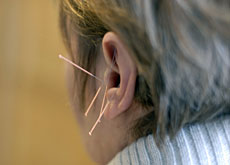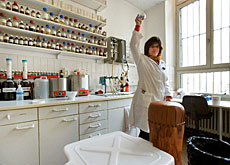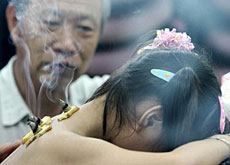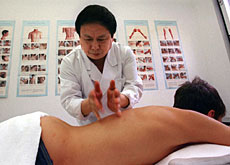Chinese medicine attracts healthy interest

People in Switzerland are increasingly turning to Chinese medicine to cure ailments such as back pain, asthma, allergies and stress problems.
But practitioners say there is still a long way to go before the profession is fully recognised and are calling for it to be covered by the basic health insurance.
Alternative therapies are on the rise. It has been estimated that around a third of the population has tried complementary medicine at least once in their lives.
Acupuncture by a registered doctor is covered by the health insurance and around 70 per cent of people have extra health coverage for other alternative therapies, according to the Federal Health Office.
Making inroads is the ancient art of Traditional Chinese Medicine (TCM), which is carried out by both qualified doctors and non-medical practitioners.
“Chinese medicine is a medical system that’s not based on the western idea of the body but the Chinese philosophy of the body. It explains diseases and health in a different way,” said Simon Becker, president of the Swiss Professional Organization for Traditional Chinese Medicine (sbo-tcm) – the largest association of non-medical TCM therapists.
“Chinese medicine tries to influence with different modalities, such as acupuncture and herbs, the harmonies that take place in the body when you get sick.”
In 1999 it was provisionally included, along with four other alternative therapies, into basic health insurance.
But in 2005, after carrying out an assessment, the government decided to strike these out, saying they were too costly.
Becker’s 1,200 member association has joined with other groups, including medical ones, to lobby for the therapies to be reinstated by putting the matter to a nationwide vote. But the move has been rejected by the government.
Polls have, however, indicated widespread public support for the initiative.
Last resort
Becker says many patients try Chinese medicine after having unsuccessfully tried more conventional methods.
This includes former Mr Switzerland and organic farmer Renzo Blumenthal, who used acupuncture to treat a chronic back problem.
“To an outsider it seems like nothing special and that it won’t have a big effect; after the first treatment my digestion was already a lot better, as was the tension in my back,” he told swissinfo at a recent sbo-tcm event.
Another convert is parliamentarian Simon Schenk, a former national ice hockey player, whose sporting career was dogged by a wrist injury.
“I tried everything, I had several operations, I tried potions, injections, diet, everything and it always stagnated,” explained Schenk.
He described his Chinese medicine treatment as a “moment of revelation” after he could finally start playing again without bandages.
Wrong impressions
However, wrong impressions of TCM still abound, with people still believing it is linked to the use of tiger bones or rhino horns. No serious practitioner would use these, said Becker, adding that it is illegal.
Chinese medicine is also gaining in acceptance in medical world, some clinics offer it and some midwives are, due to popular demand, using it during childbirth, said Becker.
However, non-medical therapists are still not recognised professionally in Switzerland. This is another goal of the alternative therapies vote.
Many Swiss therapists have trained abroad. Becker himself qualified in the United States, but the association – which has mostly Swiss members – now offers its own standards.
“In Europe we belong to the leading countries as far as hours and quality of education is concerned,” Becker told swissinfo.
“But in terms of professional recognition we’re still a bit behind other countries such as the United States and Germany… it’s an unbalanced situation which we need to balance.”
swissinfo, Isobel Leybold-Johnson in Olten
Swiss Professional Organization for Traditional Chinese Medicine (sbo-tcm) has 1,200 members of which around 700 are practising.
When it was set up in 1996 it only had around 100 members.
It is holding an acupuncture open day on April 28.
Around 200 therapists will open their doors across Switzerland.
In 1999 the interior ministry ruled that five therapies – homeopathy, herbal medicine, neural therapy, Traditional Chinese Medicine and anthroposophic medicine – should be provisionally covered by basic health insurance. This changed in 2005.
A people’s initiative has since been launched aimed at including complementary medicine in basic coverage.
It wants non-medical practitioners of alternative medicine to be recognised and guarantees that all costs associated with these therapies will be reimbursed.
It also calls for more collaboration between alternative and classical medicine and more research.
According to Chinese medicine, human health is dependent on the body’s energy – Qi – moving in a smooth and balanced way through meridians (channels) beneath the skin.
Qi consists of equal and opposite qualities – Yin and Yang – and when these become unbalanced, illness may result. Therapies restore this balance.
Acupuncture is the insertion of ultra-fine, metal needles at various carefully chosen points on the skin to treat pain and other ailments.
Other therapies include Chinese herbology and Chinese food therapy – the practice of using food combinations instead of medications.
Tui na is a massage technique and Qigong is a breathing and relaxation therapy.

In compliance with the JTI standards
More: SWI swissinfo.ch certified by the Journalism Trust Initiative




You can find an overview of ongoing debates with our journalists here. Please join us!
If you want to start a conversation about a topic raised in this article or want to report factual errors, email us at english@swissinfo.ch.